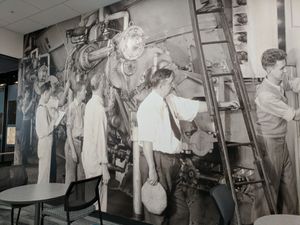Hennepin County Library scored a small coup by securing the name Bookspace for their web pages devoted to reading. And they have made very good use of it. I was interested in the book lists provided by readers. They offer reading tips by genre, including the reader-contributed lists, new books, external reference sites, and so on.
This is one part of a very well-developed website. There are RSS feeds in appropriate places, the catalog invites user comments on individual titles, you can search for events, pages aimed at particular age groups, at teachers, at librarians, and so on. There is a search box on the site: do a search and you are shown what is found on the website itself, in the catalog, and in databases and subject guides. There is also a locally developed fugitive fact file.
This is a very full destination. However they are also reaching out to folks who may not visit the website. This was the subject of an engaging presentation by Glenn Peterson at the CIC library conference, Getting in the Flow [ppt].
He discussed social networking features on the site, RSS and email alerts, personalizing a Google home page with access to library resources, providing a catalog search box for adding to your Myspace page (because people like collecting ‘gadgets’),
This is a type of presentation I really like, where somebody who wants to make their services better shows interesting work towards that end. As I listened, two questions ran through my mind. The first was about numbers: were they seeing much interaction from these new ways of reaching out? And second, there is an interesting question about scale and sharing. Hennepin County is a large public library system. Readers are interacting with the library resources, developing lists, and so on. Is the population large enough to sustain these services and make them of continuing interest? How much of this interaction is local in nature, specific to Hennepin County and its population? Is there merit in thinking about aggregating such approaches across libraries?
Share
Comments



